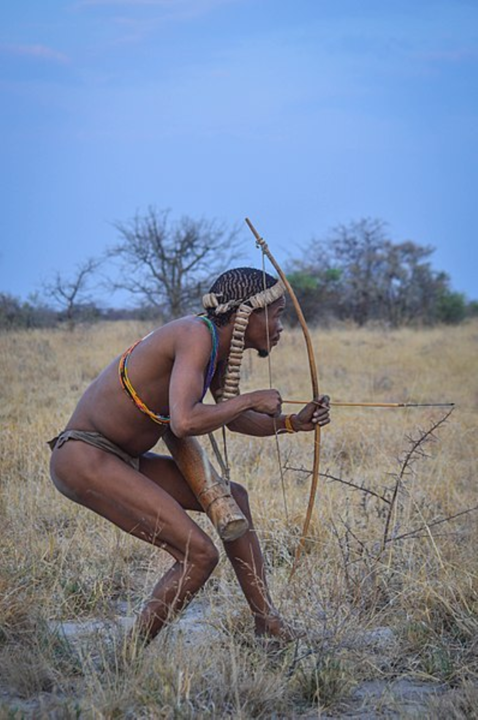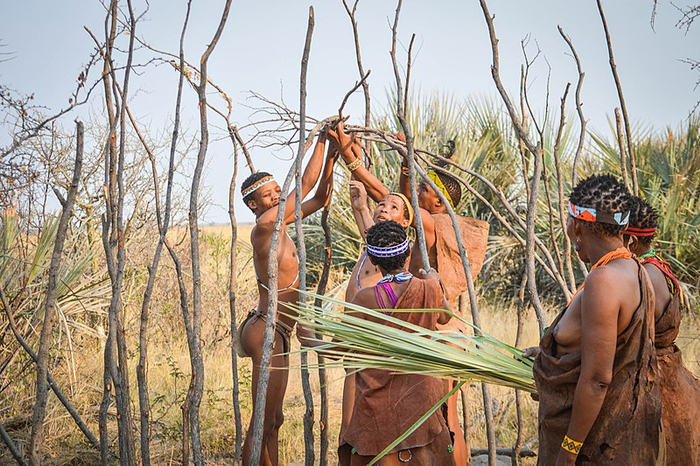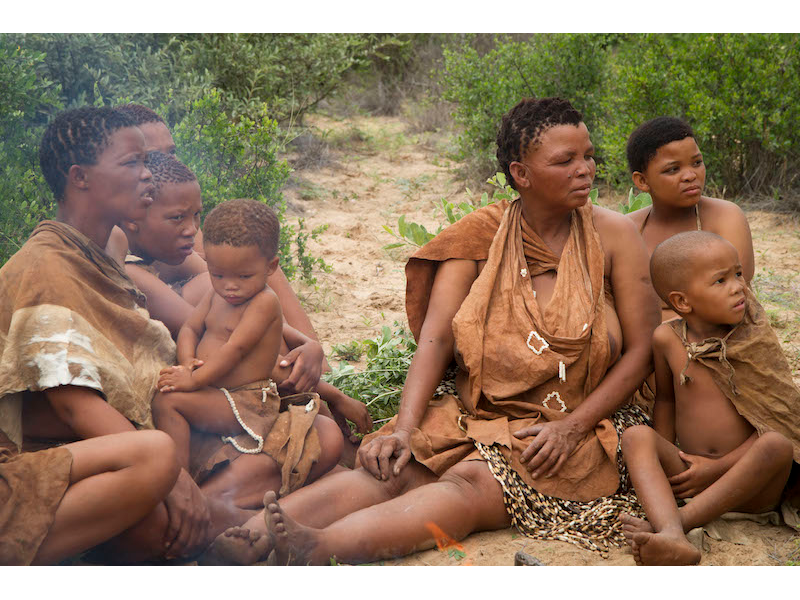Image: San people in Botswana. Source: Wikimedia Commons
The San people are amongst the oldest living tribes. Located along the Kalahari Desert spanning across Southern Africa in countries like Botswana, Angola, South Africa, and Namibia they are also known as Saan or Boesman (Bushman) which is a derogatory Dutch term for colored people, the San people live a hunter-gatherer lifestyle which has sustained them for many generations.
Their in-depth knowledge of challenging and harsh terrains has enabled their capacity to find sustenance through hunting and gathering. Their extensive knowledge of the land and resources in which they dwell has probably made the San people one the greatest hunters in the world.
Related to the Khoekhoe (Khoikhoi), which means “men of men” and describes any member of a people of southern Africa whom European explorers encountered in their sojourn to the country. They are identifiable due to their click language which is a unique integration of the tongue and mouth movement which produces sounds, words, and phrases into a difficult yet captivating speech pattern.
As a hunter-gatherer community, the San people are not known to domesticate animals or cultivate crops. Living in caves, or temporary shelters due to their migratory nature, the San people are great trackers and can follow the spoor (tracks) of any animal across any kind of terrain. The San people have become so skilled at what they do that they can easily identify different tracks made by diverse animal species as well identify the spoor of any animal that is injured from amongst a herd.

Image: San hunter. Source: Wikimedia Commons
Though known for their exceptional tracking ability, the San people are legendary hunters and their weapon of choice consists mostly of a bow and arrow. The arrow, which is meant to incapacitate the game is poisoned with the venom of a snake, or plant. Once the animal is shot the San people then patiently track the animal irrespective of the hours till it succumbs to the poison and dies.
Hunting, amongst the San people, is chiefly done by the men. It is not just an individual effort but a team one.
Tracking and hunting are done in groups and whoever kills the animal successfully has the right to allocate the meat amongst all members of the tribe. Everyone is welcome to partake in the kill and would in the future return the favor. Only the food gathered by the women within the community is not shared but reserved strictly for the woman’s immediate family.
For the San people, their dietary combination consists of both animals and vegetables. Zebras, Antelopes, Giraffes, Snakes, Eggs, Wild Honey, Fish e.t.c all make up the range of food choices for them. Not accustomed to waste, the San people also use the hides of the animals they kill for blankets.
In the dry season, when water is scarce, they usually gather moisture by digging holes in the sand in search of water or by squeezing the roots of plants.

Image: San construction. Source: Wikimedia Commons
The social construct of the San people is egalitarian. There is no recognized formal authority but the people govern themselves through consensus agreement. Disputes are resolved by allowing each agreed party to air their grievances until a resolution is reached by all.
As the world continues to experience advancement in modernization, the way of life for the San people continues to face disruption. Loss of land, enforced displacement, cultural integration, and introduction of modern agricultural practices have impacted their communities and affected their traditional hunting grounds.
While there is little or no capacity to control modern-day advancement, it is important to recognize how the activities of the San people have contributed to creating a sustainable and balanced ecosystem. Leveraging their knowledge and traditional practices can help contribute to preserving our habitats.
As the world hurtles on to increased modernization, it is instructive that more can be learned about conservation by gleaning through the connection between man and nature which the San people have successfully been able to unlock.

Okechukwu Nzeribe works with the Onitsha Chamber of Commerce, in Anambra State, Nigeria, and loves unveiling the richness of African cultures. nextquestservices@gmail.com





